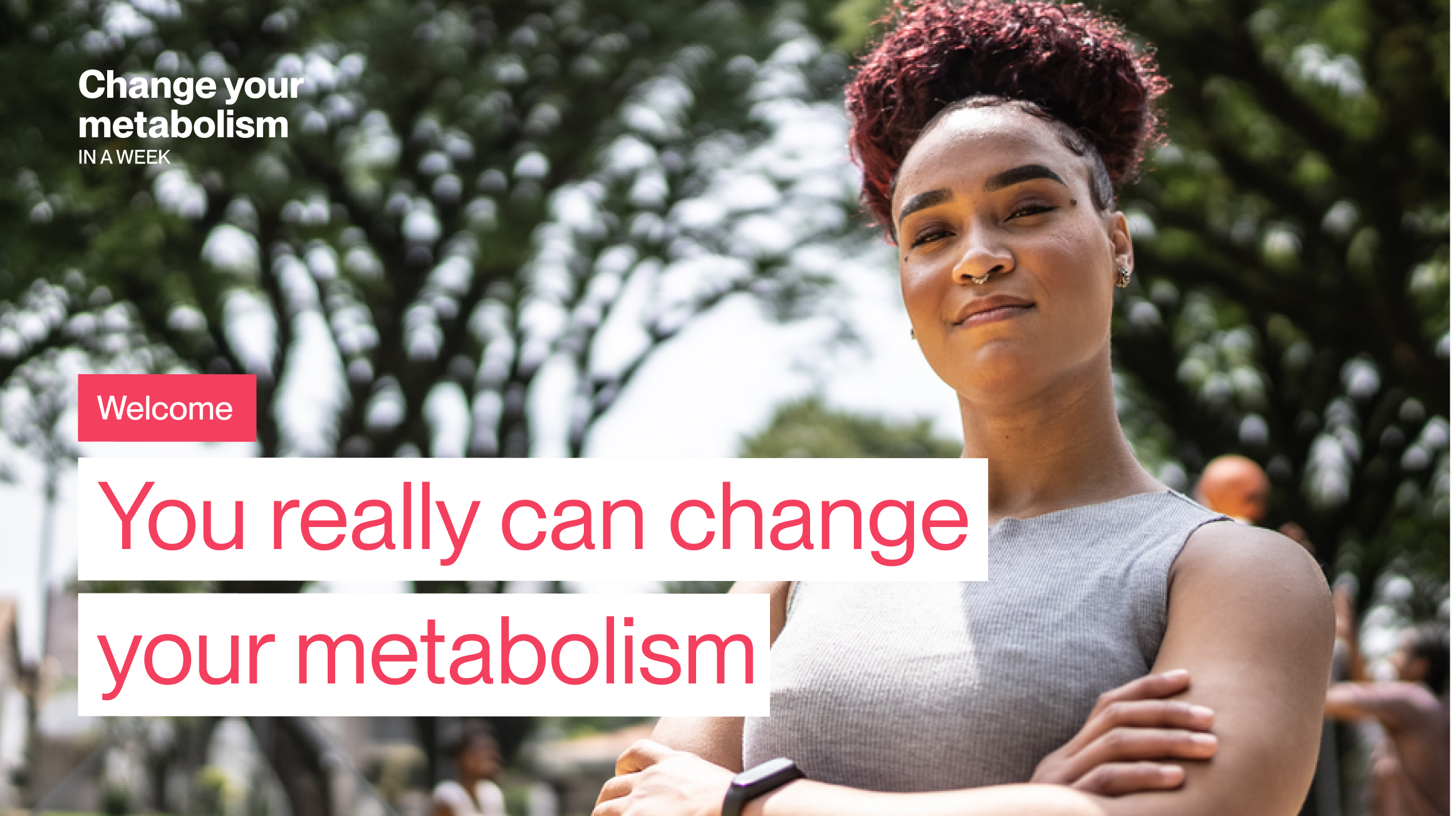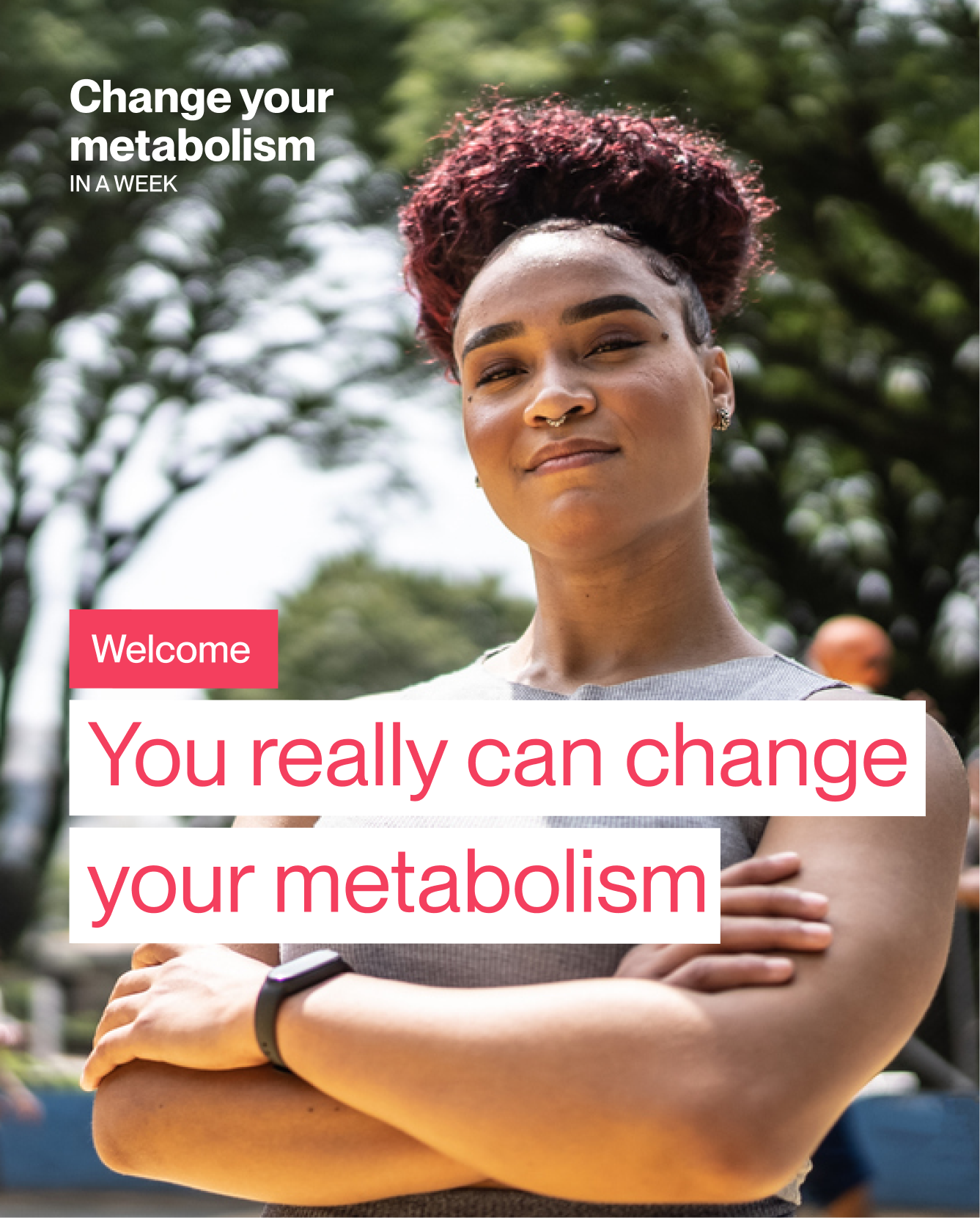

Introduction: Change your metabolism in a week
Did you know changing your metabolism can change and extend your life?
Metabolism is the process of changing energy in food and drink to energy that powers every cell in your body. Just like a machine needs fuel to function, every cell in your body needs energy and you’re made of over 37 trillion of those cells.
Your metabolism is always working, even when you're resting. It breaks down food into molecular parts and so it can use these for energy. Metabolism is how your body creates, regulates and stores energy. That’s why your metabolism doesn't just affect your weight, it determines it.
Small changes to your metabolic efficiency can have massive effects on your weight and rapidly increase your health.
Modern living sends metabolism haywire
Our bodies evolved to deal with the hunter-gatherer lifestyle but evolution hasn’t caught up with the constant access to food agriculture brought about, let alone supermarkets and Uber Eats! The average modern-day diet and lifestyle are set up to break our metabolic systems.

A diet rich in easily-metabolised energy from sugar and starch along with ultra-processed food and a sedentary lifestyle can spell disaster for your health. Your body will take on extra energy and store it because it assumes you’ll need it soon.
Our hunter-gatherer days did not see people eating 3 meals a day. Instead, there would be long periods without a meal - famine followed by feast. That’s the stone-age model of body you’re operating. For most of us, modern lifestyle is like a software update that has sent it slightly bonkers.
If you don’t use the fat your body stored as a survival mechanism, it can start to work against your health, but you’ve probably heard all that.
Let’s look first at the core aspect of changing your metabolism, the one thing you can manage and monitor constantly: your blood glucose level.
Body fat starts as glucose
Glucose is the preferred source of energy for the human body. You break a lot of food down to glucose to use it for energy. Your body tightly regulates the amount of this fuel flowing round your system to around 4-5g in your entire circulation. The level of glucose in blood has been discovered to be so important because it’s how the body regulates energy.
If the food you eat puts too much glucose into your blood, your body moves it and stores it elsewhere. If there’s not enough glucose in your bloodstream for the demands you make of it, your body creates glucose to bring it back up.
That 4-5g of glucose is only around one sugar cube’s worth and that’s in 5 litres of blood. That’s why it’s extremely easy to take in too much. An average sized banana has up to 5 sugar cubes’ worth of glucose in.

When you take in more than you need - which is ridiculously easy to do - your body needs to store the excess. It can’t stay in your blood. If you’re not diabetic, your pancreas releases insulin to guide the glucose to your storage mechanisms:
- Glycogen. Glucose gets converted and stored in the liver and muscles. This is limited storage, with around 400g in the body.
- Fat. If the first store is full, excess energy is converted to fat and stored in fat cells. This is unlimited storage.
Note - It’s not a completely linear process because you’re a collection of cells not a machine.
It’s time to take your metabolic health seriously
It’s not just about weight. Your metabolism is crucial for your overall health. A well-functioning metabolism helps your body efficiently use the nutrients from your food, supports your immune system, and keeps your organs working properly.
The choices you make every day have an effect on your physiology at a cellular level. An inefficient metabolism leads to inflammation and oxidative stress. Constant fatgiue and illnesses are often the result of low cellular energy.
Taking charge of your metabolism starts with blood glucose
The amazing thing about stabilising your body’s energy balance is how many process in your body start to work better as a result. Blood glucose is something you can learn to control whether or not you monitor it. Once you stabilise it instead of creating constant spikes and crashes, other hormones involved in your energy production and storage stabilise. This means your appetite turns ‘normal’ and cravings switch off.
How do you stabilise your blood glucose? Firstly you stop the spikes and crashes from too much glucose coming into your system.
Then, losing excess fat will help you reduce your body’s average blood glucose levels over time. You’ll feel the benefits in weeks. we'll cover this in the days to come.
Ready to start?
Every system in your body is connected. An efficient metabolism comes from more than what you choose to eat and drink.
🧆 Nutrition
🛌 Sleep
😩 Stress
🏃♂️ Movement
🏡 Environment
Over the next few days, you'll get practical things to try out so you can make small changes to your lifestyle that will help your metabolism. These hacks are just a few of the things Limbo members do when they experience the world’s most effective weight loss programme.

Try this today
1. Get a small piece of bread and a stopwatch.
2. Pop it in your mouth but don’t chew it.
3. Start the stopwatch
4. Just hold the bread in your mouth until it starts to taste sweet.
It will start to taste sweet eventually as the enzymes in saliva start to break the bonds in starch (starch is just glucose molecules bonded together).
5. Make a note of how long it took for this to happen.